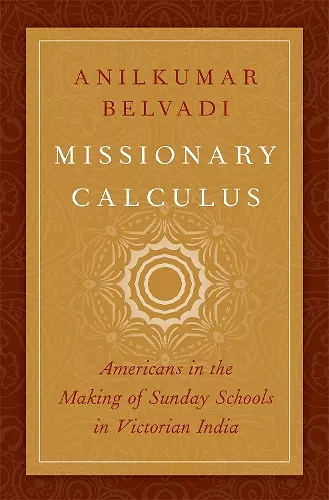Missionary Calculus
Americans in the Making of Sunday Schools in Victorian India
Format:Hardback
Publisher:Oxford University Press Inc
Published:25th Oct '19
Currently unavailable, and unfortunately no date known when it will be back

How are religious educational institutions built? In histories of evangelical institution-building in the Victorian Indian colonial period (1858-1901), this question has mostly been addressed from the perspective of the religious ends that Christian missionaries sought to achieve and the ideological obstacles they encountered. This may be called the 'values' approach. Missionary Calculus sets this aside and examines, instead, the most routine transactions of missionaries in building an evangelical institution, the Sunday school. Missionaries daily struggled with and acted upon certain questions: How shall we acquire land and money to set up such schools? What methods shall we employ to attract students? What curriculum, books, and classroom materials shall we use? How shall we tune our hymns? Shall we employ non-Christians to teach in Christian Sunday schools? The makers of colonial Sunday schools focused obsessively on the means, the material and symbolic resources, with which they felt they could achieve certain immediate objectives. Such a transactional or 'instrumental' approach resulted in stated religious 'values' being insidiously compromised. Using insights from classical Weberian sociology, and through a close scrutiny of missionary means, this book shows how the success or failure of meeting evangelical ends may be assessed. With extensive archival research, chiefly on American missionaries in colonial India, this work examines the formation of Sunday schools at the point of transnational, intercultural contact. Readers interested in religion, education, and colonial history should find the matter, method, outcomes, and narration of Missionary Calculus new and thought-provoking.
One of the great strengths of this work is that it shows how Indian responses to and engagement with missionary initiatives and work influenced, shaped, and changed the Christian mission enterprise. * Arun W. Jones, Emory University, Church History *
The author's commentary remains skillfully outside the missionary habitus, and his perceptive critique brings alive a key aspect of the transactional nature of religion and empire. A very fine read indeed. * Tim Allender, University of Sydney, Sociology of Religion *
This is... an illuminating study * Brian Stanley, University of Edinburgh, Journal of Ecclesiastical History *
In Missionary Calculus Anilkumar Belvadi provides a fresh and innovative perspective on empire and the missionary enterprise. More than an institutional history of the Anglo-American Indian school movement, Missionary Calculus shows how compromise and accommodation between mission teachers and their students produced an educational experience that was neither entirely western nor South Asian. Belvadi's book is a thoughtful and highly original look at how mission education actually functioned on a day-to-day basis. * Timothy Parsons, author of The Rule of Empires *
Focusing on American missionary endeavours to create Sunday schools in 19th-century India, Belvadi explores power and culture, and strategies and tactics, with sophistication, clarity, and fairness. His work is distinguished by a rich analysis of the target audience's shaping of educational practice and should be consulted by all interested in global missions and their intercultural impact. * Ian Tyrrell, author of Reforming the World: The making of America's Moral Empire *
ISBN: 9780190052423
Dimensions: 152mm x 236mm x 23mm
Weight: 522g
264 pages